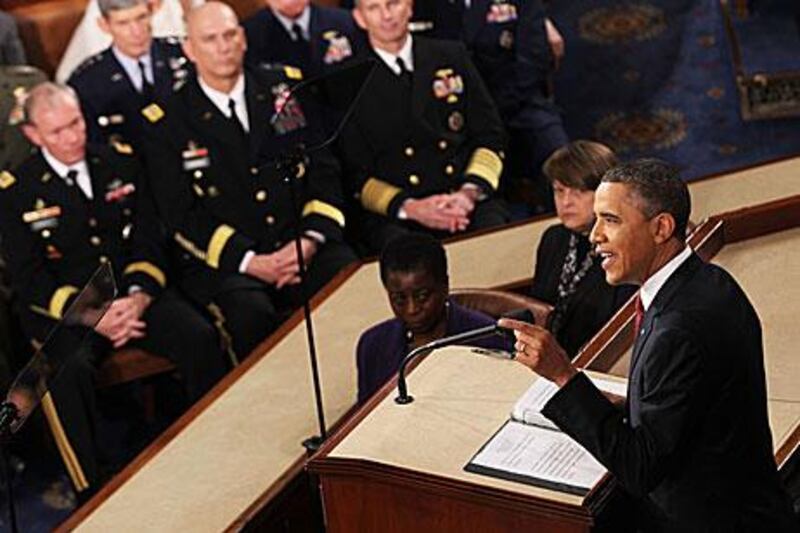WASHINGTON // US President Barack Obama brandished the deaths of Osama bin Laden and Muammar Qaddafi as an election year show of foreign policy force aimed at disarming his Republican foes.
Trumpeting his commander-in-chief credentials in an annual State of the Union address on Tuesday, Mr Obama made it clear that the traditional avenue of attack - Democratic presidents are weak on defence - would not hold in 2012.
"For the first time, there are no Americans fighting in Iraq. For the first time, in two decades, Osama bin Laden is not a threat to this country," the president said in a speech effectively launching his re-election campaign.
"Most of Al Qaeda's top lieutenants have been defeated. The Taliban's momentum has been broken, and some troops in Afghanistan have begun to come home," he said.
Addressing rows of military men in uniform, including his joint chiefs of staff, Mr Obama praised their achievements as "a testament to the courage, selflessness, and teamwork of America's armed forces".
In a highly symbolic call for unity in a polarised America, Mr Obama said a flag bearing the names of the Navy Seal team that eliminated bin Laden was one of his "proudest possessions".
"Some may be Democrats. Some may be Republicans. But that doesn't matter. Just like it didn't matter that day in the Situation Room. All that mattered that day was the mission. No one thought about politics."
But beyond the jingoistic military message, it was a clear challenge to Republican rivals not to come after him on foreign policy, a marker in the sand less than 10 months before the November 6 presidential election.
Despite several clear foreign policy successes over the past three years, Republican presidential hopefuls have nonetheless sought to stereotype the Democratic incumbent as weak, continuing a tradition dating back to the Carter administration and the Iran hostage crisis.
After winning in South Carolina and surging to the front in the Republican nomination battle, Newt Gingrich issued the ultimate insult: "President Obama is a president so weak that he makes Jimmy Carter look strong."
Mr Gingrich's main rival for the nomination, former Massachusetts governor Mitt Romney, has repeatedly accused Obama of failing on the greatest threat America faces: Iran's pursuit of nuclear weapons.
The president, in concert with the European Union, has stepped up sanctions on Iran's oil and banking sector to try to force it to stop uranium enrichment, which the West fears masks a drive to produce an atom bomb.
Mr Obama insisted that a peaceful resolution was still possible in the high-stakes international showdown with Tehran but vowed he would "take no options off the table".
"The regime is more isolated than ever before; its leaders are faced with crippling sanctions, and as long as they shirk their responsibilities, this pressure will not relent."
In an address focused heavily on domestic economic concerns, Mr Obama also found time to hail the demise of Libya's Qaddafi and warned Syria's president, Bashar Al Assad, that his regime's days were numbered.
"A year ago, Qaddafi was one of the world's longest-serving dictators - a murderer with American blood on his hands. Today, he is gone.
"And in Syria, I have no doubt that the Assad regime will soon discover that the forces of change cannot be reversed, and that human dignity cannot be denied."
While noting it was unclear how events in the Middle East and North Africa would unfold, Mr Obama said he would continue to "stand against violence and intimidation" and support the Arab Spring's democratic ideals.
"How this incredible transformation will end remains uncertain. But we have a huge stake in the outcome. We will support policies that lead to strong and stable democracies and open markets, because tyranny is no match for liberty."






